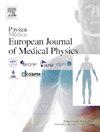Point cloud dosimetry framework for preclinical microbeam radiation therapy
IF 2.7
3区 医学
Q1 RADIOLOGY, NUCLEAR MEDICINE & MEDICAL IMAGING
Physica Medica-European Journal of Medical Physics
Pub Date : 2025-10-21
DOI:10.1016/j.ejmp.2025.105198
引用次数: 0
Abstract
Background:
Microbeam Radiation Therapy (MRT) is an emerging radiotherapy technique which is currently at the research stage. In order to further progress from research, toward clinical deployment, it is essential to develop a reliable and accurate dose engine such as Monte Carlo (MC) simulations.
Purpose:
MC execution times are far too long for practical, clinical applications. In previous studies, we used a 3D U-Net, trained with Geant4 MC simulations, to calculate the dose in digital rat phantoms. This choice of model imposes significant scalability challenges in the case of larger geometries. Casting MRT dose prediction as a 3D point cloud regression problem is a flexible and extensible solution to overcoming many of these hurdles. This problem formulation requires the use of point-based models which are unproven for the task of MRT dose prediction.
Methods:
In order to assay the viability of this family of models on this task, the SphereFormer is trained to accurately replicate the gold standard MC dosimetry on uniform voxel grids.
Results:
Furthermore, the benefits of the scalability of this method are demonstrated by the utilisation of out-of-field information to significantly improve over the existing state-of-the-art results on valley dose prediction, being accurate to within 3% for at least 84.1% of voxels compared with 78.2% for the baseline.
Conclusion:
This paper serves as a proof-of-concept study for the application of 3D point cloud methods to MRT dose prediction and marks the first time such a method have been applied to dosimetry in general.
临床前微束放射治疗的点云剂量测定框架。
背景:微束放射治疗(MRT)是一种新兴的放射治疗技术,目前尚处于研究阶段。为了进一步从研究进展到临床应用,开发可靠、准确的剂量引擎如蒙特卡罗(MC)模拟是必不可少的。目的:MC执行时间对于实际的临床应用来说太长了。在之前的研究中,我们使用了3D U-Net,并进行了Geant4 MC模拟训练,以计算数字大鼠幻影中的剂量。在更大的几何形状的情况下,这种模型的选择带来了重大的可伸缩性挑战。将MRT剂量预测作为一个3D点云回归问题是克服许多这些障碍的灵活和可扩展的解决方案。这个问题的表述需要使用基于点的模型,而这些模型对于MRT剂量预测任务来说是未经证实的。方法:为了分析该系列模型在此任务中的可行性,SphereFormer经过训练,可以在均匀体素网格上准确地复制金标准MC剂量学。结果:此外,该方法的可扩展性的好处是通过利用场外信息来显着改善现有最先进的谷剂量预测结果,至少84.1%的体素的精度在3%以内,而基线的精度为78.2%。结论:本文为3D点云方法在MRT剂量预测中的应用提供了概念验证性研究,标志着该方法首次被广泛应用于剂量学。
本文章由计算机程序翻译,如有差异,请以英文原文为准。
求助全文
约1分钟内获得全文
求助全文
来源期刊
CiteScore
6.80
自引率
14.70%
发文量
493
审稿时长
78 days
期刊介绍:
Physica Medica, European Journal of Medical Physics, publishing with Elsevier from 2007, provides an international forum for research and reviews on the following main topics:
Medical Imaging
Radiation Therapy
Radiation Protection
Measuring Systems and Signal Processing
Education and training in Medical Physics
Professional issues in Medical Physics.

 求助内容:
求助内容: 应助结果提醒方式:
应助结果提醒方式:


